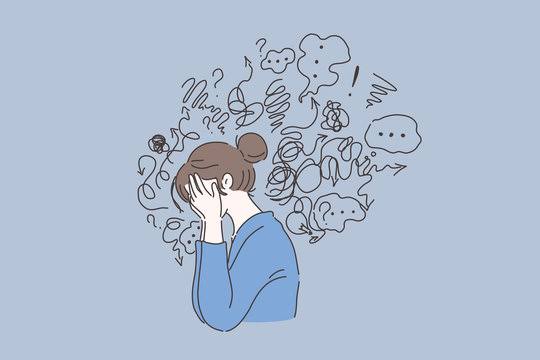#mentalhealth
#MentalHealthMatters
#MentalHealthAwareness 🧵🧵🧵
#Depression is a mental health condition that can make a person feel sad, empty, or hopeless for an extended period of time. It affects emotions, thoughts, and overall well-being.
#MentalHealthMatters
#MentalHealthAwareness 🧵🧵🧵
#Depression is a mental health condition that can make a person feel sad, empty, or hopeless for an extended period of time. It affects emotions, thoughts, and overall well-being.

🍄 Some common symptoms of depression include low mood, loss of interest in activities, changes in appetite or sleep patterns, fatigue, difficulty concentrating, and thoughts of self-harm or suicide.
➡️ Strategies to overcome depression
🍄 Seek professional help: Consult with a mental health professional, such as a therapist or psychiatrist, who can provide guidance and tailored treatment options.
🍄 Seek professional help: Consult with a mental health professional, such as a therapist or psychiatrist, who can provide guidance and tailored treatment options.
🍄 Build a strong support system: Surround yourself with understanding and supportive individuals who can offer emotional support and encouragement.
🍄 Practice self-care: Prioritize activities that promote your physical, mental, and emotional well-being, such as exercise, proper nutrition, adequate sleep, and engaging in activities you enjoy.
🍄 Challenge negative thoughts: Identify and challenge negative thought patterns by replacing them with more positive and realistic ones. Cognitive-behavioral therapy (CBT) techniques can be helpful for this.
🍄 Set achievable goals: Start with small, realistic goals and gradually work your way up. Celebrate each accomplishment, no matter how small.
🍄 Practice relaxation techniques: Explore relaxation techniques like deep breathing exercises, progressive muscle relaxation, or mindfulness meditation to manage stress and promote relaxation.
🍄 Establish a daily routine: Create a structured schedule that provides a sense of purpose and stability. Include activities you find fulfilling and make time for self-care.
🍄 Express your emotions: Find healthy outlets to express your feelings, such as journaling, art, music, or talking to a trusted friend or therapist.
🍄 Limit exposure to negativity: Minimize exposure to negative influences, whether it's news, social media, or toxic relationships. Surround yourself with positivity as much as possible.
🍄 Explore new hobbies or interests: Engaging in activities that bring you joy or stimulate your mind can help lift your mood and provide a sense of purpose.
🍄 Practice gratitude: Regularly reflect on and express gratitude for the positive aspects of your life. This can help shift your focus towards the positive.
🍄 Avoid self-isolation: Make an effort to maintain social connections, even if you don't feel like it. Seek opportunities to spend time with loved ones and engage in social activities.
🍄 Explore alternative therapies: Consider complementary approaches like acupuncture, massage, or herbal supplements, under the guidance of a healthcare professional, as additional tools for managing depression.
🍄 Be patient and kind to yourself: Remember that overcoming depression takes time. Be patient with yourself, practice self-compassion, and celebrate even small steps forward.
@threadreaderapp unroll
• • •
Missing some Tweet in this thread? You can try to
force a refresh

 Read on Twitter
Read on Twitter









